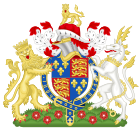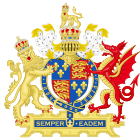Treason Act 1415
 From Wikipedia - Reading time: 6 min
From Wikipedia - Reading time: 6 min
This article needs additional citations for verification. (February 2010) |
| Act of Parliament | |
 | |
| Long title | It shall be treason to clip, wash, or file money. |
|---|---|
| Citation | 4 Hen. 5. Stat. 1. c. 6 |
| Dates | |
| Commencement | 16 March 1416 |
| Repealed | 1 May 1832 |
| Other legislation | |
| Amended by | Treason Act 1553 |
| Repealed by | Coinage Offences Act 1832 |
Status: Repealed | |
| Forgery Act 1415 | |
|---|---|
| Act of Parliament | |
 | |
| Citation | 4 Hen. 5. Stat. 1. c. 7 (Ruffhead: 4 Hen. 5. c. 7) |
| Dates | |
| Royal assent | 18 November 1416 |
| Commencement | 19 October 1416 |
| Repealed | 1 May 1832 |
| Other legislation | |
| Repealed by | Coinage Offences Act 1832 |
Status: Repealed | |
| Coin Act 1572 | |
|---|---|
| Act of Parliament | |
 | |
| Long title | An Act against the forging and counterfeiting of Foreign Coin, being not current within this Realm. |
| Citation | 14 Eliz. 1. c. 3 |
| Dates | |
| Royal assent | 30 June 1572 |
| Repealed | 1 May 1832 |
| Other legislation | |
| Repealed by | Coinage Offences Act 1832 |
Status: Repealed | |
| Coin Act 1575 | |
|---|---|
| Act of Parliament | |
 | |
| Long title | An Act against diminishing and impairing of the Queen's Majesty's Coins, and other Coins lawfully current within the Realm. |
| Citation | 18 Eliz. 1. c. 1 |
| Dates | |
| Royal assent | 15 March 1576 |
| Repealed | 1 May 1832 |
| Other legislation | |
| Repealed by | Coinage Offences Act 1832 |
Status: Repealed | |
The Treason Act 1415 (4 Hen. 5. Stat. 1. c. 6) was an Act of the Parliament of England which made clipping coins high treason, punishable by death. (It was already treason to counterfeit coins.[1]) The act was repealed by the Treason Act 1553, and then revived again in 1562.[2] The act originally only protected English coins, but was later extended in 1575 to cover foreign coins "current" within England.[3] By this time the Coin Act 1572 (14 Eliz. 1. c. 3) had already made it misprision of treason to clip foreign coins not current within the Realm.
Another act in 1415, 4 Hen. 5. Stat. 1. c. 7, extended the jurisdiction to try this category of treason to all justices in the realm, instead of just the select few known as the King's justices.
The Coin Act 1575 (18 Eliz. 1. c. 1) also abolished (for coin clipping only) the penalties of corruption of blood and forfeiture of goods and lands.
See also
[edit]References
[edit]- ^ Treason Act 1351
- ^ 5 Eliz. 1. c. 11
- ^ Coin Act 1575 (18 Eliz. 1. c. 1)
 KSF
KSF